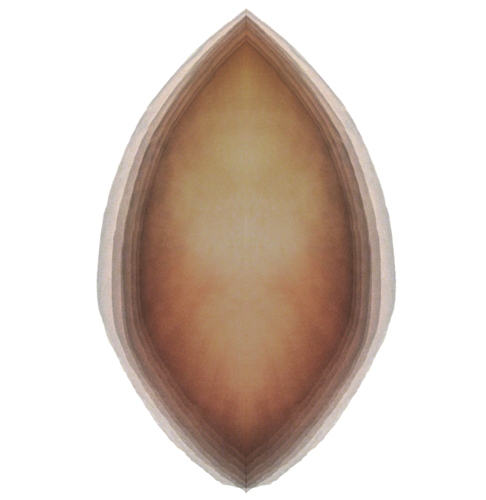Serendip is an independent site partnering with faculty at multiple colleges and universities around the world. Happy exploring!
Making Sense of Ourselves in an Evolving Universe

Normal.dotm 0 0 1 767 4376 Bryn Mawr College 36 8 5374 12.0 0 false 18 pt 18 pt 0 0 false false false
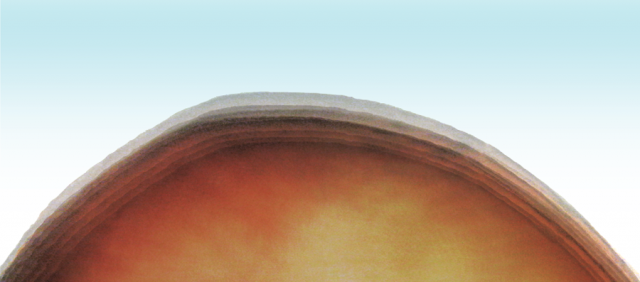
"Light." First in a sequence called "An Evolution," by Emily Artz French
“Who am I? How did I get to be this way? What’s next?”… an invitation to think together about these questions in the context of on-going evolutionary change, which occurs simultaneously in the realms of the inanimate, the living and the cultural world…building toward an imagining of the future evolution both of ourselves as individuals and of our world as a whole.
Emily Balch Seminars @ Bryn Mawr College
Anne Dalke (Dalton 6) and
Paul Grobstein (Dalton 10)
Fall 2010, T Th 11:30-1
On-line course forum
Instructions for weekly postings
Instructions for putting together a final
portfolio of your semester’s work
Student Webpapers
Anne's talking notes
Paul's talking notes
Introduction
T, Aug. 31: Finding Out Who’s Here, and What the Plans are for our Going Exploring Together...
Creation Myths--Ours and the World’s
By 6 p.m. on Wed, Sept. 1: go to our course web forum, introduce yourself and put up a link to a creation myth that “works for” or “connects to” you somehow--ethnically, ethically, historically, philosophically, imaginatively, pragmatically…
By classtime on Th, Sept. 2: read
Thomas King, The Truth About Stories: A Native Narrative (University of Minnesota, 2003).
By classtime on T, Sept. 7: reflect in our course web forum on last week's discussion
By 6 p.m. on Wed, Sept. 8: e-mail your professor a 3-pp. creation story (for yourself and the world).
I. Stories of the Universe
"More or less similar creation stories are found in the folklore of peoples all over the world. The filled a gap in man's desire to answer the profound questions about this world that we humans have asked ever since there has been human culture. We still treasure these stories as part of our cultural heritage, but we turn to science when we want to learn the real truth about the history of the world" (Ernst Mayr, What Evolution Is, 2001).
Th, Sept. 9: Discussion of
- Michael S. Turner, "Origin of the Universe." Scientific American 301, 3 (September 2009): 36-44.
- The scale of humanness
- Deep time line (click on instructions, explore, get a sense of change in time of the earth and life on it
T, Sept. 14: reflect in our course web forum on last week's discussion.
By 6 p.m. on Wed, Sept. 15: e-mail your professor a 3-pp. essay in which you reflect on and/or re-conceive your story with an extended time dimension.
Th, Sept. 16: Discussion of
- Evolution 101 (explore at least sections 1-3)
- Darwin's Living Legacy
- Scientists Cite Fastest Case of Human Evolution
T, Sept. 21: reflect in our course web forum on last week's discussion
By 6 p.m. on Wed, Sept. 22: e-mail your professor a 3-pp. essay in which you reflect on and/or reconceive your story with an evolutionary perspective.
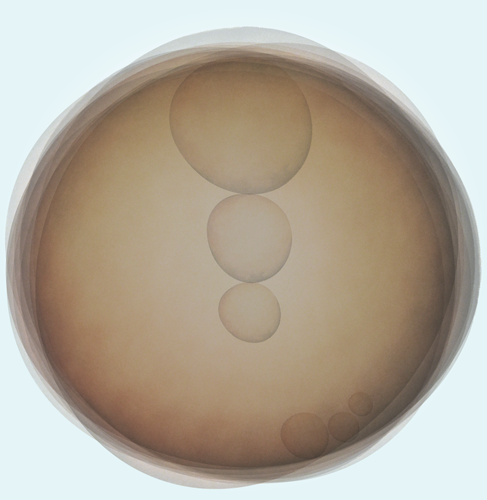
"Cell"
II. Stories of Culture
"Did you ever wonder how it is we imagine the world in the way we do....we are surrounded by stories, and we can trace these stories back to other stories and from there back to the beginnings of language....these are...the cornerstones of our culture" (Thomas King, The Truth About Stories: A Native Narrative, 2005).
Th, Sept. 23: Discussion of
- "Variables": excerpts from Jared Diamond, Guns, Germs and Steel: The Fates of Human Societies (Norton, 1997, 2005).
T, Sept. 28: reflect in our course web forum on last week's discussion.
By 6 p.m. W, Sept. 29: e-mail your professor a 3-pp. essay about the evolution of a culture with which you are familiar.
Th, Sept. 30: Discussion of
- Elisabeth Penissi, Speaking in tongues and The first language, in Evolution of Language. Science Magazine 303, 5662 (February 27, 2004)
- Margaret Wertheim, "Niles Eldredge: Bursts of Cornets and Evolution." New York Times (March 9, 2004)
T, Oct. 5: reflect in our course web forum on last week's discussion.
By 6 p.m. Wed, Oct. 6: e-mail your professor a 3-pp. essay in which you explore the causes underlying evolution of culture.
Thurs, Oct. 7: Discussion of Chapters 5, 6 of Colin Renfrew, Prehistory: The Making of the Human Mind (Modern Library, 2009, handout) and discussion with Emily Artz French about the evolution of her sequence, "An Evolution."
FALL BREAK: Oct. 12 & 14
T, Oct. 19: reflect in our course web forum on our last discussion before fall break.
Th, Oct. 21: Octavia Butler, The Parable of the Sower (Warner, 1993).
T, Oct. 26: reflect in our course web forum on last week's discussion.
By 6 p.m. Wed, Oct. 27: e-mail your professor a 3-pp. essay about cultural evolution which includes a future.
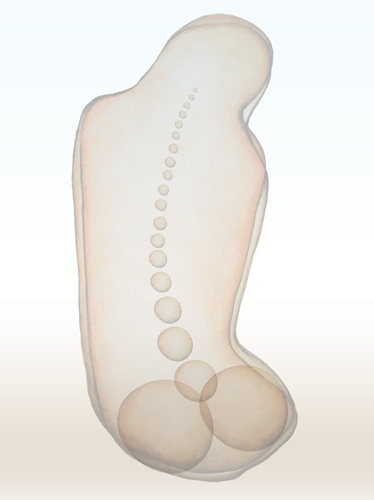
"Spine"
III. Stories of Individuals
"A human being is part of the whole, called by us ‘universe,’ a part limited in time and space" (Albert Einstein, 1954).
Th, Oct. 28: Apostolos Doxiadis, Christos Papadimitriou, Alecos Papadatos and Annie Di Donna, Logicomix: An Epic Search for Truth (Bloomsbury, 2009).
T, Nov. 2: reflect in our course web forum on last week's discussion.
By 6 p.m. Wed, Nov. 3 (Paul's group) and by 6 p.m. Fri, Nov. 5 (Anne's group): research the biography of an individual whose “evolutionary” life interests you; send your professor "notes toward" or a "first draft" of what you have found; also post a short summary on-line for class discussion
Th, Nov. 4: Discussion of
- Alison Gopnik, How Babies Think, Scientific American (July, 2010), 303, 76-81
- Paul Bloom, The Moral Life of Babies, NYTimes Magazine, May 5, 2010
T, Nov. 9: reflect in our course web forum on last week's discussion.
By 6 p.m. Wed, Nov. 10 (Paul's group) and by 6 p.m. Fri, Nov. 12 (Anne's group): e-mail your professor a 3-pp. essay about individual evolution.
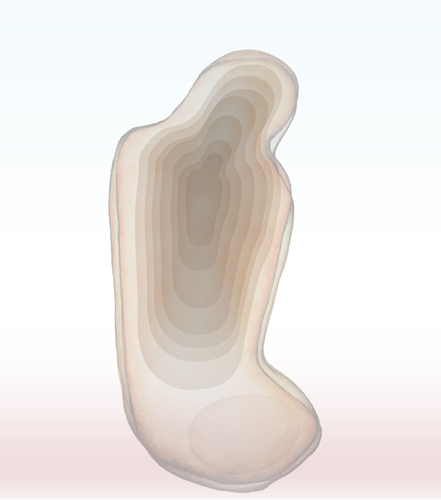
"Awareness"
IV. Brains as Storytellers
"The Brain--is wider than the Sky--/For--put them side by side--/The one the other will contain/With ease--and You--beside--" (Emily Dickinson).
Th, Nov. 11: Discussion of two talks by V.S. Ramachandran:
- Phantoms in the brain. The Emerging Mind. Reith Lectures 2003.
- On your mind. TED video. March 2007.
T, Nov. 16: reflect in our course web forum on last week's discussion.
By 6 p.m. Wed, Nov. 17 (Paul's group) and by 6 p.m. Friday, Nov. 19 (Anne's group): e-mail your professor a 3-pp. essay reflecting on the implications of thinking about the brain as the site of story-construction
Th, Nov. 18: Discussion of
T, Nov. 23: reflect in our course web forum on last week's discussion.
THANKSGIVING BREAK: Nov. 25
T, Nov. 30: Discussion of
- Jonathan Haidt, "The Emotional Dog and its Rational Tail: A Social Intuitionist Approach to Moral Judgement." Psychological Review 2001, 108, 814-834 (go to Haidt's webpage @ http://people.virginia.edu/~jdh6n/ and request the article; it will be e-mailed to you)
Th, Dec. 2: reflect in our course web forum about our discussions of the unconscious
By 6 p.m. Fri, Dec. 3: e-mail your professor a 3-pp essay reflecting on the implications of unconscious processes in the construction of stories
T, Dec. 7: reflect in our course web forum about the semester's evolution
Th, Dec. 9: Final Performances
12:30, Fri, Dec. 17 (both groups): Final Paper reflecting on the significance of the storytelling brain for one of your essays about the universe, culture or individuals-- and put together a portfolio of your semester’s work
Student Webpapers
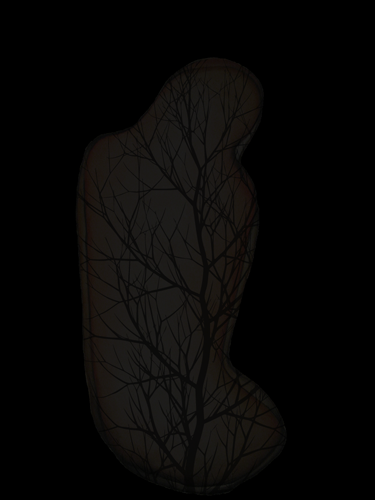
"Loss"
"I find it easier to tell myself the story of my failure...as a human being, than to have to
live the story of making the sustained effort to help" (Thomas King, The Truth About Stories).
"...we navigate by stories, but sometimes we only escape by abandoning them"
(Rebecca Solnit, A Field Guide to Getting Lost).

